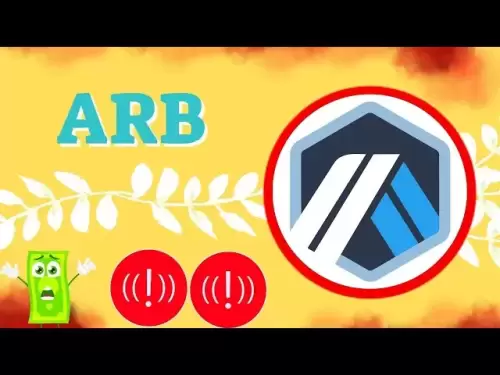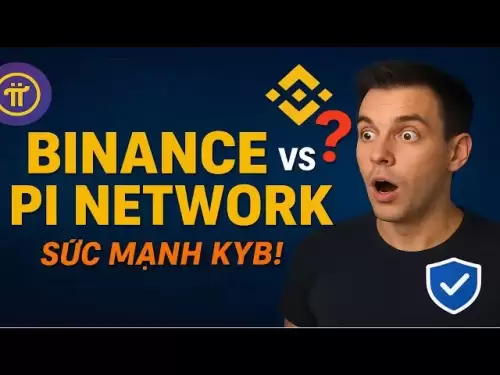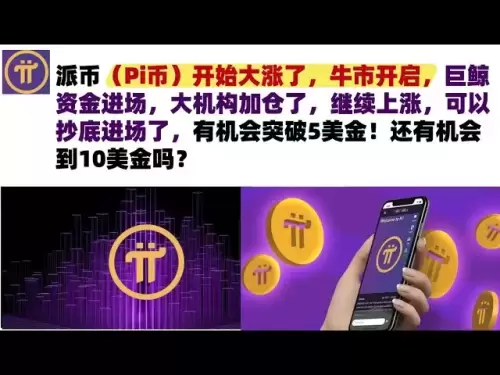-
 Bitcoin
Bitcoin $116700
0.13% -
 Ethereum
Ethereum $4229
5.18% -
 XRP
XRP $3.290
0.28% -
 Tether USDt
Tether USDt $1.000
0.01% -
 BNB
BNB $804.4
1.46% -
 Solana
Solana $181.3
1.92% -
 USDC
USDC $1.000
0.02% -
 Dogecoin
Dogecoin $0.2453
8.11% -
 TRON
TRON $0.3359
-0.82% -
 Cardano
Cardano $0.8187
2.71% -
 Hyperliquid
Hyperliquid $43.56
6.46% -
 Chainlink
Chainlink $21.22
9.48% -
 Stellar
Stellar $0.4533
0.95% -
 Sui
Sui $3.948
2.90% -
 Bitcoin Cash
Bitcoin Cash $571.0
-2.75% -
 Hedera
Hedera $0.2657
1.33% -
 Avalanche
Avalanche $24.32
2.80% -
 Ethena USDe
Ethena USDe $1.001
0.02% -
 Litecoin
Litecoin $122.2
-0.70% -
 Toncoin
Toncoin $3.440
1.95% -
 UNUS SED LEO
UNUS SED LEO $8.978
-0.09% -
 Shiba Inu
Shiba Inu $0.00001385
5.32% -
 Uniswap
Uniswap $10.94
0.24% -
 Polkadot
Polkadot $4.116
3.88% -
 Dai
Dai $1.000
0.00% -
 Pepe
Pepe $0.00001233
5.82% -
 Bitget Token
Bitget Token $4.511
0.53% -
 Cronos
Cronos $0.1572
2.50% -
 Monero
Monero $272.0
-1.82% -
 Ethena
Ethena $0.7563
17.60%
How to get cheap ETH through staking?
Staking ETH earns rewards that lower your average cost over time, not a direct discount; it requires locking up ETH and involves risks like slashing and market volatility.
Mar 28, 2025 at 03:21 am
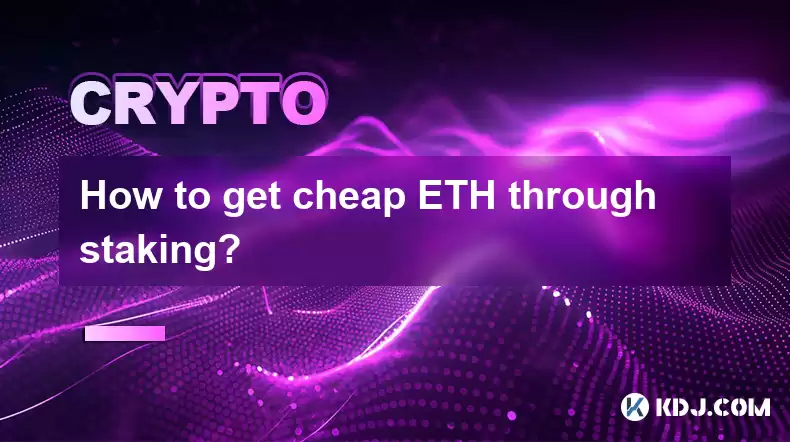
Understanding ETH Staking and its Potential for Cost Savings
Staking Ethereum (ETH) isn't a direct path to acquiring ETH at a discounted price like buying on sale. Instead, it's a method of earning rewards in ETH for securing the Ethereum network. These rewards effectively lower your average cost per ETH over time, making it seem cheaper. It's crucial to understand this distinction. You're not buying ETH at a lower price point upfront; you're earning it gradually as a reward for participation.
The Mechanics of ETH Staking Rewards
To stake ETH, you need to lock up a minimum of 32 ETH in a validator node. This is a significant investment. If you don't have 32 ETH, you can participate in staking pools which combine smaller amounts of ETH from multiple users. These pools operate validator nodes on your behalf, sharing the rewards proportionally. The rewards you receive are paid out in newly minted ETH and transaction fees. The amount you earn depends on several factors including network congestion and the overall health of the network. The reward rate isn't fixed and fluctuates.
Exploring Different Staking Options
Running your own validator node: This requires 32 ETH and significant technical expertise. You'll be responsible for maintaining the node's uptime and security. The rewards are higher than using a staking pool, but the risk is also greater.
Using a staking pool: This is the most common method for individuals who don't have 32 ETH. Staking pools allow you to delegate your ETH to a larger pool, sharing the rewards with other participants. The reward rate is generally lower than running your own node, but the risk is also significantly reduced.
Using a staking-as-a-service provider: These platforms handle the technical aspects of staking for you. They typically charge a fee for their services. This option offers convenience but might have lower returns due to these fees. Carefully research the reputation and security measures of any provider before using their services.
Factors Affecting ETH Staking Rewards
Several factors influence the amount of ETH you earn through staking:
Network congestion: Higher transaction volume on the Ethereum network generally leads to higher transaction fees, thus increasing your staking rewards.
Validator performance: Maintaining a consistently active and properly functioning validator node is crucial for maximizing rewards. Downtime or penalties can significantly reduce your earnings.
Competition: The more validators participating in the network, the more ETH is distributed among them, potentially reducing individual rewards.
Staking pool fees: If you use a staking pool, the platform will typically charge a fee, which will reduce your net rewards. These fees vary widely between providers.
Understanding the Risks Involved in ETH Staking
While staking can be profitable, it's important to be aware of the associated risks:
Loss of staked ETH: While unlikely with reputable staking pools, there's a small risk of losing your staked ETH due to technical issues or security vulnerabilities. This is more pronounced if you run your own validator node.
Impermanent loss: This isn't directly related to staking itself but rather to the liquidity pools some staking platforms might offer. It refers to the potential loss in value compared to holding your assets directly.
Slashing: Validators can face penalties (slashing) if they act maliciously or violate the network's rules. This can result in a loss of a portion of your staked ETH.
Market volatility: The value of your ETH rewards is subject to market fluctuations. Even if your staking rewards are consistent, the value of those rewards in fiat currency can change.
Calculating Your Potential Return on Investment (ROI)
Calculating your ROI from ETH staking requires considering several variables:
Initial investment: The amount of ETH you stake.
Annual percentage rate (APR): The estimated yearly return on your staked ETH. This can vary widely depending on the chosen method.
Fees: Any fees charged by staking pools or service providers.
Time horizon: The length of time you plan to stake your ETH.
It's important to use realistic APR estimates and factor in all fees when projecting your ROI. Avoid overly optimistic projections.
Choosing the Right Staking Method for You
The best staking method depends on your technical skills, risk tolerance, and the amount of ETH you possess. If you have 32 ETH and possess strong technical expertise, running your own validator node might be suitable. However, for most users, joining a reputable staking pool is a more practical and less risky option. Consider the fees, reputation, and security measures of any platform before committing your ETH.
Frequently Asked Questions
Q: Is staking ETH guaranteed to make me money?
A: No, staking ETH doesn't guarantee profit. While rewards are generally positive, the amount you earn depends on several factors, and the value of your ETH rewards can fluctuate due to market volatility. There's also a risk of slashing penalties if you operate a validator node incorrectly.
Q: How long does it take to get my staking rewards?
A: The frequency of reward payouts varies depending on the chosen staking method. Some platforms distribute rewards daily, while others do so weekly or monthly.
Q: Can I unstake my ETH whenever I want?
A: The unstaking process takes time, typically ranging from a few days to several weeks. There's a waiting period before you can access your ETH again. Check the specific terms and conditions of your chosen staking platform.
Q: Are there any tax implications for staking rewards?
A: Yes, staking rewards are generally considered taxable income in most jurisdictions. Consult with a tax professional to understand the specific tax implications in your region.
Q: What happens if the Ethereum network experiences a significant security breach?
A: The risk of losing your staked ETH due to a major security breach is relatively low, especially when using reputable staking pools. However, it's not entirely impossible. Thorough due diligence in choosing a platform is crucial.
Disclaimer:info@kdj.com
The information provided is not trading advice. kdj.com does not assume any responsibility for any investments made based on the information provided in this article. Cryptocurrencies are highly volatile and it is highly recommended that you invest with caution after thorough research!
If you believe that the content used on this website infringes your copyright, please contact us immediately (info@kdj.com) and we will delete it promptly.
- Trump, Crypto Vehicle, and WLFI Tokens: A New York Minute on the Latest Buzz
- 2025-08-10 00:30:12
- Wheat Penny Fortune: Unearthing Valuable Coins in Your Pocket Change
- 2025-08-10 00:35:19
- Dogecoin, PENGU, and Remittix: A New York Minute in Crypto
- 2025-08-10 01:10:12
- Ozark AI: Investment Opportunities and Analyst Projections for 2025
- 2025-08-10 01:15:17
- Cryptocurrencies 2025: Top Buys and Market Predictions
- 2025-08-10 01:20:12
- Pendle's Price Jump: Riding the Wave of Market Sentiment
- 2025-08-10 01:25:11
Related knowledge

How to purchase Aragon (ANT)?
Aug 09,2025 at 11:56pm
Understanding Aragon (ANT) and Its PurposeAragon (ANT) is a decentralized governance token that powers the Aragon Network, a platform built on the Eth...

Where can I buy UMA (UMA)?
Aug 07,2025 at 06:42pm
Understanding UMA and Its Role in Decentralized FinanceUMA (Universal Market Access) is an Ethereum-based decentralized finance (DeFi) protocol design...

How to buy Storj (STORJ) tokens?
Aug 09,2025 at 07:28am
Understanding Storj (STORJ) and Its Role in Decentralized StorageStorj is a decentralized cloud storage platform that leverages blockchain technology ...

What is the best app to buy Nano (NANO)?
Aug 09,2025 at 03:35am
Understanding Nano (NANO) and Its Unique FeaturesNano is a feeless, instant cryptocurrency designed for fast peer-to-peer transactions. Unlike many ot...

Where can I purchase Siacoin (SC)?
Aug 08,2025 at 11:14am
Understanding Siacoin (SC) and Its Role in the Sia NetworkSiacoin (SC) is the native cryptocurrency of the Sia decentralized cloud storage platform, a...
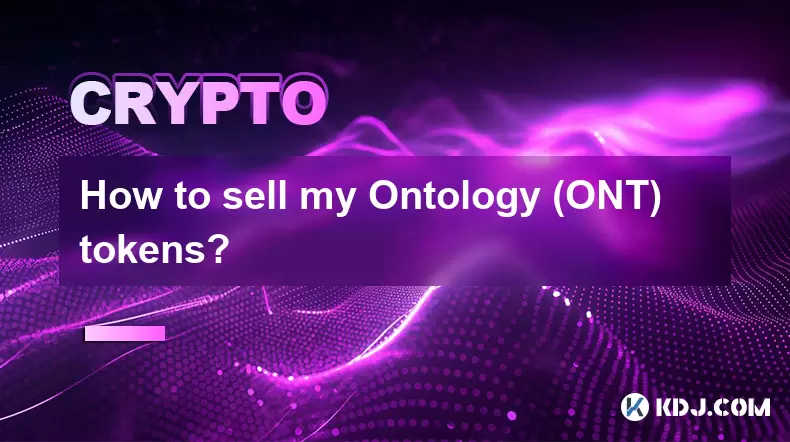
How to sell my Ontology (ONT) tokens?
Aug 09,2025 at 06:08pm
Understanding Ontology (ONT) and Its Trading EcosystemBefore selling your Ontology (ONT) tokens, it's essential to understand the nature of the crypto...

How to purchase Aragon (ANT)?
Aug 09,2025 at 11:56pm
Understanding Aragon (ANT) and Its PurposeAragon (ANT) is a decentralized governance token that powers the Aragon Network, a platform built on the Eth...

Where can I buy UMA (UMA)?
Aug 07,2025 at 06:42pm
Understanding UMA and Its Role in Decentralized FinanceUMA (Universal Market Access) is an Ethereum-based decentralized finance (DeFi) protocol design...

How to buy Storj (STORJ) tokens?
Aug 09,2025 at 07:28am
Understanding Storj (STORJ) and Its Role in Decentralized StorageStorj is a decentralized cloud storage platform that leverages blockchain technology ...

What is the best app to buy Nano (NANO)?
Aug 09,2025 at 03:35am
Understanding Nano (NANO) and Its Unique FeaturesNano is a feeless, instant cryptocurrency designed for fast peer-to-peer transactions. Unlike many ot...

Where can I purchase Siacoin (SC)?
Aug 08,2025 at 11:14am
Understanding Siacoin (SC) and Its Role in the Sia NetworkSiacoin (SC) is the native cryptocurrency of the Sia decentralized cloud storage platform, a...

How to sell my Ontology (ONT) tokens?
Aug 09,2025 at 06:08pm
Understanding Ontology (ONT) and Its Trading EcosystemBefore selling your Ontology (ONT) tokens, it's essential to understand the nature of the crypto...
See all articles





















